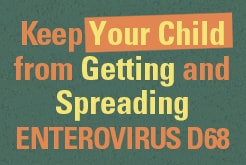Key points
- EV-D68 typically causes respiratory illness, which can be mild (like a common cold) or more serious.
- Children with asthma may have a higher risk for severe respiratory illness caused by EV-D68 infection.
- There are no vaccines to prevent EV-D68 infections.

What it is
Enterovirus D68 (EV-D68) is one of more than 100 non-polio enteroviruses. Non-polio enteroviruses, like EV-D68, are common, with most infections causing no symptoms or only mild symptoms.
You are more likely to get infected with enteroviruses during summer and fall, but infections can happen year-round.
Signs and symptoms
EV-D68 can cause mild to severe respiratory illness or no symptoms at all.
- Mild symptoms may include runny nose, sneezing, cough, body and muscle aches.
- Serious symptoms may include wheezing and difficulty breathing.
Acute flaccid myelitis (AFM) symptoms
Call your doctor right away if:
EV-D68 can also cause AFM, an uncommon but dangerous neurological condition that mostly affects children. AFM causes the muscles and reflexes in the body to become weak. Symptoms include:
- Arm or leg weakness
- Pain in the neck, back, arms, or legs
- Difficulty swallowing or slurred speech
- Difficulty moving the eyes or drooping eyelids
- Facial droop or weakness
Who is at risk
In general, infants, children, and teenagers are most likely to get infected with enteroviruses and become ill. This is because they do not yet have immunity (protection) from previous exposure to these viruses. CDC believes this is also true for EV-D68. Adults can get infected with enteroviruses, but they are more likely to have no symptoms or mild symptoms.
Children with asthma
Children with asthma may have a higher risk for severe symptoms from EV-D68 and other respiratory illnesses. Families should follow CDC guidance to maintain control of symptoms during enterovirus season. The season occurs each year in the United States during summer and fall.
How it spreads
Since EV-D68 causes respiratory illness, the virus can be found in an infected person’s respiratory secretions, such as:
- Saliva
- Nasal mucus
- Sputum (mucus-like secretions from the lungs)
EV-D68 likely spreads from person to person when an infected person:
- Coughs
- Sneezes
- Touches a surface that is then touched by others
Prevention
There are no vaccines to prevent EV-D68 infections. You can take other actions to help protect yourself and others from health risks caused by respiratory viruses, including EV-D68. CDC's Respiratory Virus Guidance provides practical recommendations and information to help you lower your risk. To prevent severe illness from EV-D68, children and adults with asthma should also follow CDC's information on how to manage their asthma.
Testing and diagnosis
Most healthcare providers are not able to test for EV-D68. EV-D68 can only be diagnosed by doing specific lab tests on specimens from a person's nose and throat or blood.
Many hospitals and some doctors can test ill patients to see if they have enterovirus infection. However, most hospitals and doctors cannot do specific testing to determine the type of enterovirus, like EV-D68. CDC and some state health departments test for different enterovirus types by doing specialized tests including PCR or molecular sequencing.
Managing EV-D68 and asthma
CDC recommends the following:
- Discuss and update your asthma action plan with your primary care provider.
- Take your prescribed asthma medications, especially long-term control medications.
- Be sure to keep your reliever medication with you.
- Get a flu vaccine when available each year.
- If you develop new or worsening symptoms, follow your asthma action plan.
- If your symptoms do not go away, call your doctor right away.
- If you support a child with asthma, be sure the caregiver and/or teacher is aware of the child's condition know how to help.
Treatment and recovery
There is no specific treatment or antiviral available for people with respiratory illness caused by EV-D68. Talk to a doctor about your symptoms and how to best control them. Some people with a dangerous respiratory illness may need to be hospitalized and receive intensive supportive therapy.

